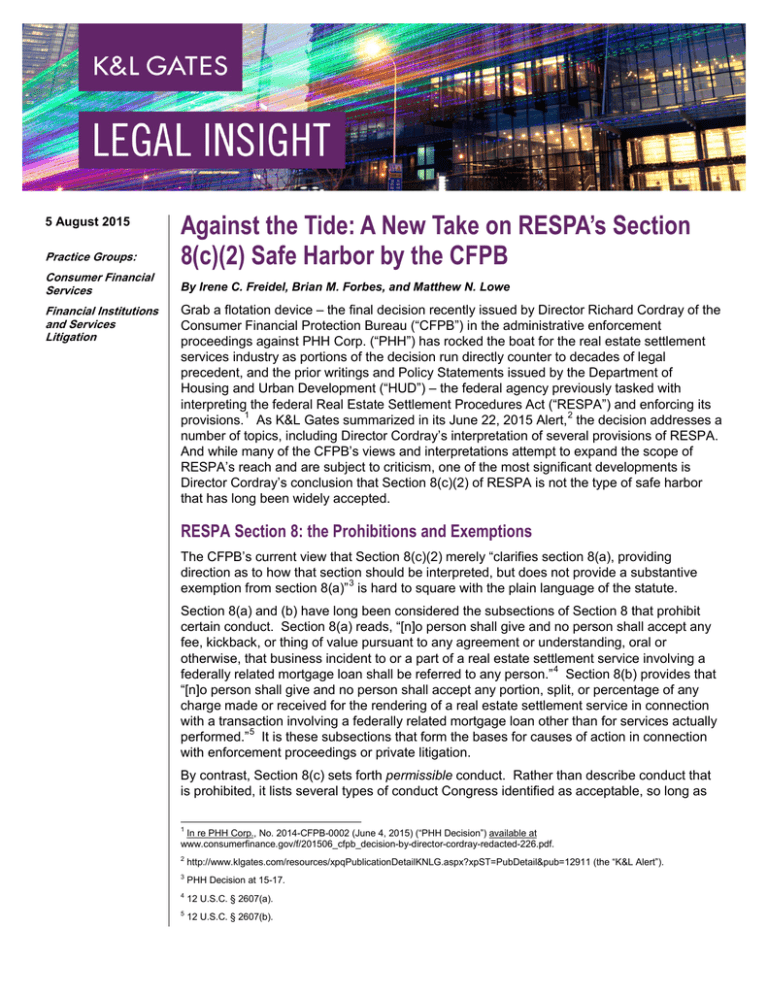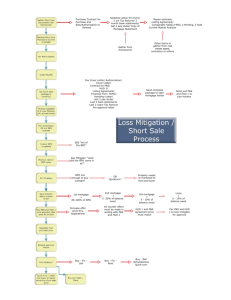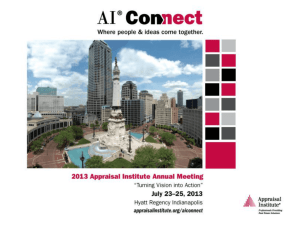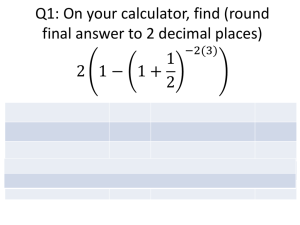
5 August 2015
Practice Groups:
Consumer Financial
Services
Financial Institutions
and Services
Litigation
Against the Tide: A New Take on RESPA’s Section
8(c)(2) Safe Harbor by the CFPB
By Irene C. Freidel, Brian M. Forbes, and Matthew N. Lowe
Grab a flotation device – the final decision recently issued by Director Richard Cordray of the
Consumer Financial Protection Bureau (“CFPB”) in the administrative enforcement
proceedings against PHH Corp. (“PHH”) has rocked the boat for the real estate settlement
services industry as portions of the decision run directly counter to decades of legal
precedent, and the prior writings and Policy Statements issued by the Department of
Housing and Urban Development (“HUD”) – the federal agency previously tasked with
interpreting the federal Real Estate Settlement Procedures Act (“RESPA”) and enforcing its
provisions. 1 As K&L Gates summarized in its June 22, 2015 Alert, 2 the decision addresses a
number of topics, including Director Cordray’s interpretation of several provisions of RESPA.
And while many of the CFPB’s views and interpretations attempt to expand the scope of
RESPA’s reach and are subject to criticism, one of the most significant developments is
Director Cordray’s conclusion that Section 8(c)(2) of RESPA is not the type of safe harbor
that has long been widely accepted.
RESPA Section 8: the Prohibitions and Exemptions
The CFPB’s current view that Section 8(c)(2) merely “clarifies section 8(a), providing
direction as to how that section should be interpreted, but does not provide a substantive
exemption from section 8(a)” 3 is hard to square with the plain language of the statute.
Section 8(a) and (b) have long been considered the subsections of Section 8 that prohibit
certain conduct. Section 8(a) reads, “[n]o person shall give and no person shall accept any
fee, kickback, or thing of value pursuant to any agreement or understanding, oral or
otherwise, that business incident to or a part of a real estate settlement service involving a
federally related mortgage loan shall be referred to any person.” 4 Section 8(b) provides that
“[n]o person shall give and no person shall accept any portion, split, or percentage of any
charge made or received for the rendering of a real estate settlement service in connection
with a transaction involving a federally related mortgage loan other than for services actually
performed.” 5 It is these subsections that form the bases for causes of action in connection
with enforcement proceedings or private litigation.
By contrast, Section 8(c) sets forth permissible conduct. Rather than describe conduct that
is prohibited, it lists several types of conduct Congress identified as acceptable, so long as
1
In re PHH Corp., No. 2014-CFPB-0002 (June 4, 2015) (“PHH Decision”) available at
www.consumerfinance.gov/f/201506_cfpb_decision-by-director-cordray-redacted-226.pdf.
2
http://www.klgates.com/resources/xpqPublicationDetailKNLG.aspx?xpST=PubDetail&pub=12911 (the “K&L Alert”).
3
PHH Decision at 15-17.
4
12 U.S.C. § 2607(a).
5
12 U.S.C. § 2607(b).
Against the Tide: A New Take on RESPA’s Section 8(c)(2)
Safe Harbor by the CFPB
certain conditions are met. Importantly, the subsection begins, “Nothing in this section [i.e.,
sub-sections 8(a) and (b)] shall be construed as prohibiting…
•
the “payment of a fee” to attorneys, title company agents, or lender agents “for
services actually performed” (Section 8(c)(1));
•
“the payment to any person of a bona fide salary or compensation or other payment
for goods or facilities actually furnished or for services actually performed”
(Section 8(c)(2));
•
“payments pursuant to cooperative brokerage and referral arrangements or
agreements between real estate agents and brokers” (Section 8(c)(3)); and
•
affiliated business arrangements “so long as (A) a disclosure is made of the
existence of such an arrangement … [and] a written estimate of the charge or range
of charges” is provided; (B) use of the affiliated entity is not required (except for “the
services of an attorney, credit reporting agency, or real estate appraiser chosen by
the lender”); and (C) “the only thing of value that is received from the arrangement,
other than the payments permitted under this subsection, is a return on the
ownership interest or franchise relationship” (Section (c)(4), (5)). 6
Thus, when read together, the plain language of Section 8(c)(2) on its face stands for the
proposition that a “bona fide” payment for “services actually performed” falls outside the
sphere of conduct that is prohibited by subsections 8(a) and (b). Indeed, as explained
below, this has been the position taken by the courts and even HUD prior to Director
Cordray’s decision.
When Interpreting RESPA, Federal Appellate Courts and HUD Have Uniformly
Concluded that Section 8(c)(2) Provides an Exemption to RESPA 8(a) Liability
HUD had long recognized that Section 8(c) of RESPA, including subsection 8(c)(2), provides
a carve-out for conduct that would otherwise be prohibited by subsections 8(a) and (b):
6
•
In 1997, HUD sent a letter to a lender explaining how Section 8(c)(2) applies to
captive mortgage reinsurance agreements – which PHH heavily relied upon in its
appeal to Director Cordray. 7 In that letter, HUD advised that “[i]f … the lender’s
reinsurance affiliate actually performs reinsurance services and compensation from
the primary insurer is bona fide and does not exceed the value of the reinsurance,
then such payments would be permissible under subsection 8(c),” but arrangements
“in which reinsurance services are not actually performed or in which the payments
to the reinsurer are not bona fide and exceed the value of the reinsurance would
violate Section 8 …”8
•
Later, in 1999, HUD issued Statement of Policy 1999-1 addressing the interplay of
Section 8(a) and (c)(2) for payments between lenders and mortgage brokers, which
recognized that if “goods or facilities were actually furnished or services were actually
performed for the compensation paid” and if “the payments are reasonably related to
12 U.S.C. § 2607(c)(1)-(5) (emphasis added).
7
Letter from Letter from N. Retsinas, Ass’t Sec’y for Hous.–Fed. Hous. Comm’r, HUD, to S. Samuels, Countrywide Funding Corp.
(Aug. 6. 1997).
8
Id. at 3 (emphasis added).
2
Against the Tide: A New Take on RESPA’s Section 8(c)(2)
Safe Harbor by the CFPB
the value of the goods or facilities that were actually furnished or services that were
actually performed” then the payments did not violate Section 8(a), because they
were protected by Section 8(c)(2)’s safe harbor. 9 Indeed, the 1999 Policy Statement
was issued in response to a Congressional Report requesting HUD clarify Section 8,
and which read, in part, that ‘‘Congress never intended payments by lenders to
mortgage brokers for goods or facilities actually furnished or for services actually
performed to be violations of [Sections 8](a) or (b) … of RESPA.’’ 10
•
Then in 2001, HUD issued Statement of Policy 2001-1 in response to courts that had
misinterpreted the 1999 policy statement, and HUD stated that “application of both
parts of the HUD test [articulated in its 1999 policy statement] is required before a
determination can be made regarding the legality of a lender payment to a mortgage
broker …”11
•
On January 5, 2011, HUD intervened and filed an appellate brief in Carter v. WellesBowen Realty, Inc., No. 10-3922 (6th Cir.), in which HUD acknowledged that Section
8(c) sets out exceptions. 12 In its brief, HUD stated:
Congress, however, provided a safe harbor for certain activities. The prohibition
of kickbacks and unearned fees does not apply to “bona fide * * * payment[s] * * *
for services actually performed.” Id. § 2607(c)(2). Another exception is for
“affiliated business arrangements,” as defined by RESPA, provided that three
additional statutory conditions are satisfied: the arrangement is disclosed to the
consumer; the consumer is not required to use any particular settlement services
provider; and the only thing of value received from the arrangement, other than
payments for services actually performed, is a return on the ownership interest or
franchise relationship. Id. § 2607(c)(4)(A), (B), (C). 13
Similarly, courts, including federal Circuit Courts of Appeal across the country, have long
held that Section 8(c)(2) creates a safe harbor to protect conduct that would otherwise be
considered actionable under subsections 8(a) or (b). 14 For example, the Seventh Circuit has
9
64 Fed. Reg. 10,080, 10,084 (Mar. 1, 1999).
10
Id. (quoting Conference Report on the Departments of Veteran Affairs and Housing and Urban Development (H.R. Conf. Rep.
No. 105-769, 105th Cong., 2d Sess. 260 (1998) at 260).
11
66 Fed. Reg. 53,052, 53,055 (Oct. 18, 2001).
12
Carter v. Welles- Bowen Realty, Inc., No. 10-3922, Doc. No. 006110833806 (6th Cir. Jan. 5, 2011)
13
Id. at 4.
14
See, e.g., Galiano v. Fid. Nat. Title Ins. Co., 684 F.3d 309, 314 (2d Cir. 2012) (“RESPA’s ‘safe harbor provision’…, § 8(c),
provides that § 8(a) shall not be construed as prohibiting payments by a title company for goods, facilities actually furnished, or
services actually performed.”); O’Sullivan v. Countrywide Home Loans, Inc., 319 F.3d 732, 740-41 (5th Cir. 2003) (holding that
“RESPA’s stated goal of eliminating ‘kickbacks or referral fees that tend to increase unnecessarily the costs of certain settlement
services,’ is furthered by the reasonable relationship test” under Section 8(c)(2)); Mims v. Stewart Title Guar. Co., 590 F.3d 298,
304 (5th Cir. 2009) (“Section 8(c) of RESPA contains several exceptions to the general rule…”); Carter v. Welles-Bowen Realty,
Inc., 736 F.3d 722, 728 (6th Cir. 2013) (holding Section 8(c)(2) is one of the safe harbors under RESPA and “ protects ‘the
payment to any person of a bona fide salary or compensation or other payment for goods or facilities actually furnished or for
services actually performed’”); Egerer v. Woodland Realty, Inc., 556 F.3d 415, 420-21 (6th Cir. 2009) (“Under RESPA, the referral
of settlement service business is not compensable, except as provided by 12 U.S.C. § 2607(c), which contains a list of fees,
salaries, compensation and payments that are not prohibited by § 2607(a).”); Howland v. First Am Title Ins. Co., 672 F.3d 525,
531-33 (7th Cir. 2012); Glover v. Standard Fed. Bank, 283 F.3d 953, 965 (8th Cir. 2002); Bjustrom v. Trust One Mortg. Corp., 322
F.3d 1201, 1208 (9th Cir. 2003) (holding payments did not violate Section 8 where “total compensation received … was
reasonably related to the services it provided”); Geraci v. Homestreet Bank, 347 F.3d 749, 751 (9th Cir. 2003) (“Section 8(c)
provides a safe harbor…”); Schuetz v. Banc One Mortg. Corp., 292 F.3d 1004, 1011 (9th Cir. 2002) (holding that under 8(c)(2) the
“pivotal question is whether … total compensation is reasonable”); Smith v. Argent Mortgage Co., 331 Fed. Appx. 549, 555 (10th
Cir. 2009); Culpepper v. Irwin Mortg. Corp., 491 F.3d 1260, 1276 (11th Cir. 2007) (holding Section 8(c)(2) required analysis of
3
Against the Tide: A New Take on RESPA’s Section 8(c)(2)
Safe Harbor by the CFPB
stated that “as long as the [defendant] performed any services … they are allowed a
reasonable fee under Section 8(c)(2). To establish a violation of Section 8, the plaintiffs
would need to show that the fee paid was not reasonably related to the services provided.” 15
Likewise, the Eighth Circuit has stated “Section 8(c) clearly anticipates payments to
individuals for goods or facilities actually furnished or for services actually performed, and
specifically excludes these payments from the Section 8(a) proscription.” 16 Notably, none of
these decisions concludes that the amount of the payment for settlement services rendered
is irrelevant to the extent an agreement exists in which one party receives business as a
result of the referral.
Thus, prior to the PHH Decision, HUD as well as the federal courts of appeal appear to be
unanimous in their treatment of Section 8(c)(2). 17
The PHH Decision Charts a New Course
In the PHH Decision, the CFPB addressed Sections 8(a) and (c) in the context of mortgage
insurance and reinsurance. As the PHH Decision explained, mortgage lenders obtain
mortgage insurance to protect themselves in case a borrower defaults, and mortgage
insurers sometimes engage mortgage reinsurers to share some of the risk, in exchange for a
portion of the mortgage insurance payments. 18 In the enforcement proceeding, the CFPB
alleged that PHH, a mortgage lender, referred business to certain mortgage insurers, who, in
turn paid kickbacks to PHH by making payments to PHH’s subsidiary mortgage reinsurer. 19
On appeal from a decision of an administrative law judge, Director Cordray concluded that
PHH (and its subsidiary mortgage reinsurer) violated Section 8(a) by referring loans to
mortgage insurers in exchange for kickbacks in the form of mortgage reinsurance payments
to the subsidiary. Key to Director Cordray’s decision was PHH’s referral of almost all of its
mortgage insurance business to mortgage insurers who had signed “captive” agreements to
purchase mortgage reinsurance from PHH’s mortgage reinsurance subsidiary. 20 PHH
argued that its conduct fell within Section 8(c)(2)’s safe harbor, because the payments from
the mortgage insurers to its subsidiary mortgage reinsurer were “bona fide … compensation
… for services actually performed;” the mortgage reinsurer took on risk commensurate with
the payments it received from the mortgage insurers. 21 Director Cordray, however, adopted
a new and stark interpretation of Section 8(c)(2) that is at odds with the plain language of the
whether fees charged were reasonable for the services rendered); Hirsch v. BankAmerica Corp., 328 F.3d 1306, 1308-09 (11th
Cir. 2003). Despite the abundance of Circuit Court decisions, some federal district courts have found that Section 8(c) is not
necessarily an exception to Section 8(a).
15
Howland, 672 F.3d at 533.
16
Glover, 283 F.3d at 965.
17
Indeed, in a recent Consent Order with another entity, the CFPB referred to Section 8(c)(2) as an “exemption” – although it
ultimately concluded that the payments at issue still violated Section 8(a), because “[e]ntering a contract with the agreement or
understanding that in exchange the counterparty will refer settlement services … violated Section 8(a).” See Consent Order, In re
Lighthouse Title, Inc., No. 2014-CFPB-0015, Doc. 1 ¶ 9 (Sept. 30, 2014) available at
http://files.consumerfinance.gov/f/201409_cfpb_consent-order_lighthouse-title.pdf (“RESPA Section 8(c)(2) provides an exemption
for ‘payment[s] to any person of a bona fide salary or compensation or other payment for goods or facilities actually furnished or
for services actually performed.’” (quoting 12 U.S.C. § 2607(c)(2)).
18
PHH Decision at 3-4.
19
Id. at 3-4.
20
Id. at 12-14.
21
Id. at 12, 20-21.
4
Against the Tide: A New Take on RESPA’s Section 8(c)(2)
Safe Harbor by the CFPB
statute, legal precedent, and even HUD’s prior statements. According to the decision,
Section 8(c)(2) “does not provide a substantive exemption from section 8(a)” and Section
8(a) prohibits “a payment that is tied in any way to a referral of business.” 22 In other words,
even if payments made for services rendered were at (or even below) market rate, Section
8(c)(2) did not insulate the parties from liability under Section 8(a) if there is a referral in the
transaction, because the payments would merely be a “pretext to provide compensation for a
referral.” 23 This interpretation guts the import of Section 8(c)(2)’s safe harbor.
Yet, Director Cordray was dismissive of PHH’s contention that his interpretation of Section
8(c)(2) would “undo years worth of official interpretations and policy statements issued by
HUD” – concluding that PHH’s own interpretations of these agency statements are “not
particularly germane.”24 He then attempted to distinguish HUD’s 1997 letter regarding
Section 8(c)(2) – while ignoring the 1999 and 2001 Statements of Policy. Director Cordray
stated that the 1997 letter was nonbinding, and regardless, “to the extent that the letter is
inconsistent with my textual and structural interpretation of section 8(c)(2), I reject it.” 25
Additionally, Director Cordray relied solely on two inapposite legal decisions – while largely
ignoring the numerous cases holding that Section 8(c)(2) protects bona fide payments for
goods, services, and facilities rendered. First, Director Cordray looked to Culpepper v. Irwin
Mortg. Corp., 253 F.3d 1324 (11th Cir. 2001), but in the 2001-1 Statement of Policy, HUD
expressly rejected Culpepper’s holding of “focusing exclusively on the presumed intent of the
lender in making the payments” rather than looking at whether the payments were
reasonably related to the service performed. 26 After the 2001 Policy Statement was issued,
the Eleventh Circuit adopted HUD’s analysis concluding that “the 2001 [Statement of Policy]
had made clear that ‘it [was] necessary to determine whether compensable services were
provided by the broker and whether the total amount of broker compensation was
reasonable in the light of the circumstances of each loan.’” 27 And Director Cordray’s reliance
on Arthur v. Ticor Title Ins. Co. of Florida, 569 F.3d 154, 158 (4th Cir. 2009), appears
misplaced as the court there recognized that the examples listed in Section 8(c) create safe
harbors to liability under Section 8. 28
Although the PHH Decision is only Director Cordray’s interpretation in an administrative
enforcement proceeding, and not a policy statement or binding rule subject to notice and
comment, the position taken by the CFPB in the PHH enforcement action reflects a
willingness by the CFPB to regulate and influence conduct through enforcement without
22
Id. at 16-17.
23
Id. at 17 (“even a reasonable payment may not be ‘bona fide’ if it is not made solely for the services but also for a referral” and
accordingly would violate Section 8); see also id. at 16 (“Regardless of whether the price that the mortgage insurers paid was
inflated or was set at the fair market value of the reinsurance they received, PHH still benefited from the arrangement because [its
mortgage reinsurer] received (profitable) business from the mortgage insurers that it would not otherwise have received.”); id. at
17 (“Then the distinct meaning of “bona fide” in section 8(c)(2) is that the payment must be solely for the service actually being
provided on its own merits, but can not be a payment that is tied in any way to a referral of business.”).
24
Id. at 19.
25
Id. at 17-18.
26
66 Fed. Reg. at 53,054; Schuetz, 292 F.3d at 1011 (“The 2001 Statement explicitly rejects Culpepper's interpretation, and
reiterates the position taken in the 1999 Statement…”); Culpepper v. Irwin Mortg. Corp., 491 F.3d 1260, 1276 (11th Cir. 2007)
(acknowledging that its prior Culpepper decision cited by Director Cordray was rejected by HUD).
27
Culpepper, 491 F.3d at 1269 (quoting Heimmermann v. First Union Mortgage Corp., 305 F.3d 1257, 1264 (11th Cir. 2002).
28
Arthur, 569 F.3d at 159 (“Section 8(c)[(1)] makes clear that Ticor did not violate Section 8 of RESPA by paying its agents for
their services.”).
5
Against the Tide: A New Take on RESPA’s Section 8(c)(2)
Safe Harbor by the CFPB
regard to case law and prior agency decisions, leaving the settlement services industry to
square a novel interpretation of RESPA without reliance on their prior guides.29
The Road Ahead
The road certainly does not end with the PHH Decision. Indeed, PHH filed a petition for
review of the Director’s decision with the D.C. Circuit Court of Appeals. 30 The request for
judicial review asks the D.C. Circuit to address several issues decided by the Director,
including his interpretation of Section 8(c)(2). 31 Among the issues identified by PHH for
which it seeks judicial review is whether the decision “violate[s] due process by retroactively
applying new interpretations of RESPA to prohibit conduct that was at the time of the
conduct, expressly permitted by agency regulations and guidance.”32 We will continue to
monitor the PHH litigation and report back on future RESPA developments.
Authors:
Irene C. Freidel
Brian M. Forbes
Matthew N. Lowe
irene.freidel@klgates.com
+1.617.951.9154
brian.m.forbes@klgates.com
+1.617.261.3152
matthew.lowe@klgates.com
+1.617.951.9183
Anchorage Austin Beijing Berlin Boston Brisbane Brussels Charleston Charlotte Chicago Dallas Doha Dubai Fort Worth Frankfurt
Harrisburg Hong Kong Houston London Los Angeles Melbourne Miami Milan Moscow Newark New York Orange County Palo Alto Paris
Perth Pittsburgh Portland Raleigh Research Triangle Park San Francisco São Paulo Seattle Seoul Shanghai Singapore Spokane
Sydney Taipei Tokyo Warsaw Washington, D.C. Wilmington
K&L Gates comprises more than 2,000 lawyers globally who practice in fully integrated offices located on five
continents. The firm represents leading multinational corporations, growth and middle-market companies, capital
markets participants and entrepreneurs in every major industry group as well as public sector entities, educational
institutions, philanthropic organizations and individuals. For more information about K&L Gates or its locations,
practices and registrations, visit www.klgates.com.
This publication is for informational purposes and does not contain or convey legal advice. The information herein should not be used or relied upon in
regard to any particular facts or circumstances without first consulting a lawyer.
© 2015 K&L Gates LLP. All Rights Reserved.
29
For a summary of all of the issues addressed in the PHH Decision, refer to the K&L Alert referenced in note 2.
30
PHH Corp. v. CFPB, No. 15-1177 (D.D.C.).
31
Id., Doc. No. 1564427 (July 24, 2015).
32
Id. at 3.
6





